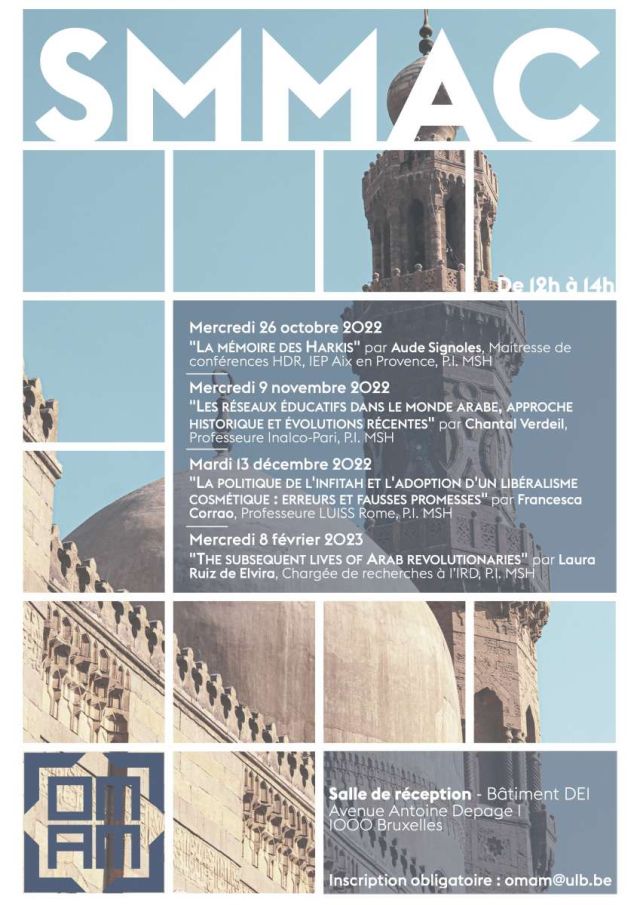Séminaire interdisciplinaire de l'OMAM "La politique de l'infitah et l'adoption d'un libéralisme cosmétique : erreurs et fausses promesses."
13/12/2022
par Prof. Francesca Corrao, Università Internazionale degli Studi Sociali Guido Carli de Rome (Professeure invitée MSH-OMAM)
Conférence donnée dans le cadre du Séminaire Mondes Musulmans et Arabes Contemporains (SMMAC), séminaire interdisciplinaire de l'OMAM
The aim of the Renewed Mediterranean Partnership (1992-1995) to create a free trade area and construct a thoroughgoing regional entity through economic, political and social progress, were only partly fulfilled. The EU, in fact, was intent on investing in the East while the reforms implemented in the countries to the South and East of the Mediterranean pursued development models that lacked inclusiveness and were flawed by cronyism and corruption. The socalled politics of Infitah, promoted mostly the interest of the oligarchies and spread of the conservative religious figures who took a softer line on terrorism. These, combined with fierce repression of civil society, which kept the ruthless and authoritarian governments in power. At the economic level, neo-laissez-faire policies neither stimulated growth nor transformed the countries of the MENA area (Middle East and North Africa) into dynamic elements in the world economy, and they certainly had no effect on the problems of poverty and social injustice. Persisting clientelism together with the involvement of governmental hierarchies in the privatizations blocked the process of economic liberalization (Beau, Graciet 2009). These dynamics, together with the effects of recurrent international crises, stood in the way of a broad project for reform involving both Islam and the population. The lack of democratic support on the one hand drove the governments to accept the conditions imposed by the religious establishment to legitimize their exercise of power, and on the other hand held the countries hostage to international political and economic aid. The question is, how intellectuals anticipated the illusion and the the failure of the so called Infitah (opening), and why their opinion was voiceless in the media.
Francesca Maria Corrao est professeure ordinaire de langue et de culture arabes au département de sciences politiques de la Libera Università Internazionale degli Studi Sociali Guido Carli de Rome. Ses recherches portent sur la pensée politique dans le monde arabe, les études culturelles, l'histoire du Moyen-Orient, les études de genre, la littérature arabe et le dialogue interculturel. Le professeur Corrao est président de la Fondazione Orestiadi, membre de l'Union des arabisants et islamistes européens (UEAI) et membre du comité exécutif des European Scholars of Modern Arabic Literature (EURAMAL).
Parmi ses publications récentes figurent : L'Islam non è terrorismo, eds. F.M. Corrao, L. Violante (Il Mulino, Roma, 2018); Islam, State and Modernity. Mohammed Abed Al-Jabri and the Future of the Arab World, eds. Z. Eyadat, F.M. Corrao, H. Hashas (Palgrave Macmillan US, 2017); Islam, Religion and Politics (Luiss University Press, 2017); Poesia Araba (Istituto per l'Oriente Carlo Alfonso Nallino, Roma, 2017); "Premessa", Percorsi di tansizione democratica e politiche di riconciliazione in Nord Africa, ed. Di Tolla, (Editoriale Scientifica, Naples, 2017); "Some Observations on Humour in Islamic Culture", The Arabist: Budapest Studies in Arabic (37) 2016.
Mardi 13 décembre 2022 de 12h à 14h
Salle de réception
Bâtiment DE1 – Niveau 3 – R3.105
Avenue Antoine Depage 1
1000 Bruxelles
Incription obligatoire par email : Jihane.sfeir@ulb.be

